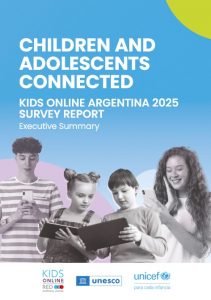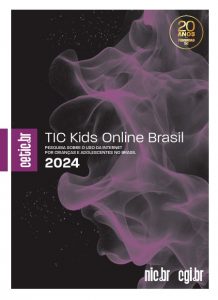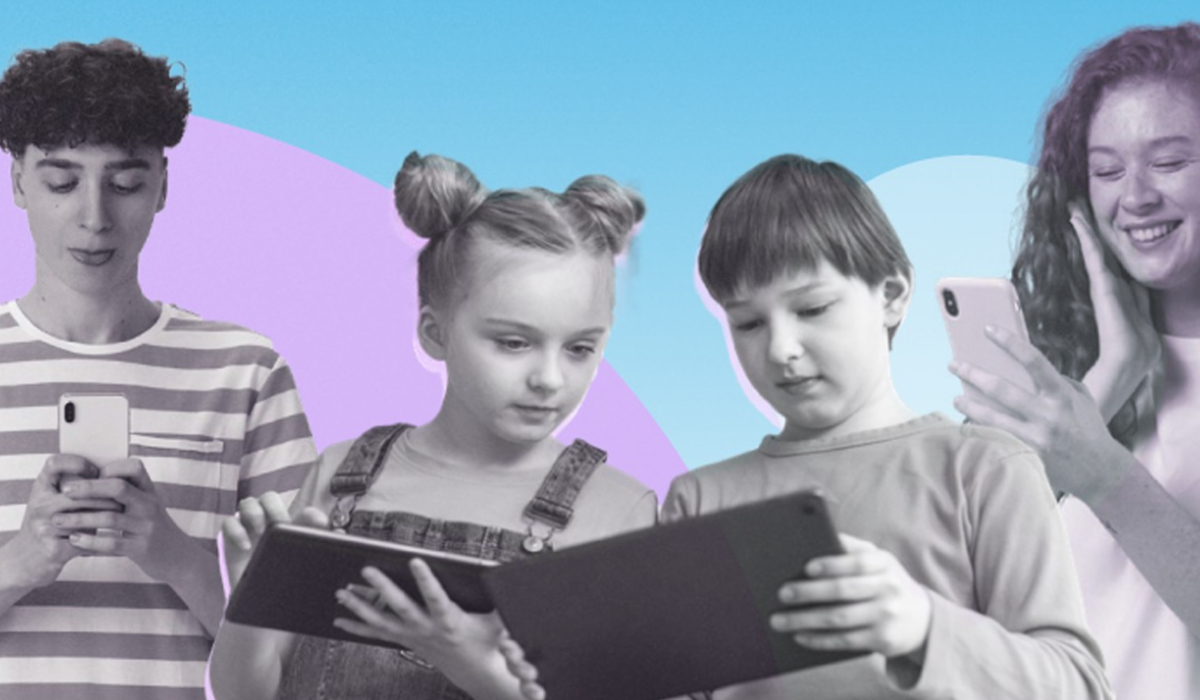 The anxieties that this ‘lose, lose’ dilemma gives rise to mean that potential benefits of the digital environment for children are too easily missed in the public call to restrict children’s digital access rather than regulate and manage big tech’s access to children.
The anxieties that this ‘lose, lose’ dilemma gives rise to mean that potential benefits of the digital environment for children are too easily missed in the public call to restrict children’s digital access rather than regulate and manage big tech’s access to children.
Kids Online Argentina conducted a nationwide survey of nearly 6000 children aged 9-17 years old, following up on their earlier survey as part of the very first GKO surveys in 2015. Led by UNICEF Argentina, the new findings show that:
- 95% have a connected mobile phone.
- Access is increasingly mobile-first or mobile-only, with children gaining their own phone around 9 years old.
- Digital skills and literacies are uneven—while most can download apps, fewer can make their profile private, deactivate geolocation, or determine whether online information is reliable. Digital skills are also unequal by age and socio-economic status.
As a highly unequal society, Argentina struggles to provide good quality education for all and overcome gender inequalities. This also makes it hard to address the new risks posed by online gambling (24% of 12-17-year-olds have done this) or, indeed, prepare for new opportunities such as generative AI (58% of 9–17-year-olds have used this, while 24% don’t know anything about it).
In my keynote welcoming the new report in Buenos Aires, I situated the research within the global research and policy landscape, advocating a child rights approach to interpreting and acting on the findings, including setting out what Child Rights by Design means for all the policymakers and businesses whose actions impact on children in a digital world. Only a holistic approach can grapple with the mix of risks and opportunities that the research revealed, including that:
- 61% of 9-17 year olds went online for schoolwork
- 50% learn something new online every day
- 36% engage in online civic and community conversations
- Yet also, 1 in 3 met an online contact offline, 2 in 3 accessed online information about diet and losing weight, 2 in 3 looked online for ways to make easy money, 1 in 2 saw online hate, violence, discrimination or use of drugs, and 1 in 4 saw suicide content.
 In Brazil, ICT Kids Online 2024 presented the latest annual research findings from Cetic.br, the Regional Center for Studies on the Development of the Information Society. The survey interviewed 2,424 children and 2,424 parents or legal guardians nationwide, finding that:
In Brazil, ICT Kids Online 2024 presented the latest annual research findings from Cetic.br, the Regional Center for Studies on the Development of the Information Society. The survey interviewed 2,424 children and 2,424 parents or legal guardians nationwide, finding that:
- Now, younger and poorer children are getting online: this improves equality but possibly also vulnerability, especially as much of this access is “mobile online”— unless educational resources and parental support are provided.
- Children aged 9-17 years old are doing a wide range of online activities – including half of them engaging with the news, a third accessing health information, a quarter looking for information about their neighbourhood or job opportunities, and one in ten talking about politics.
- On the other hand, 29% of children experienced something online that upset or bothered them, with 12% having been treated offensively, 42% saw someone discriminated against and, among 11-17 year olds, 1 in 5 exposed to content about ways to get very thin and 1 in 10 to self-harm content.
These and many related findings were discussed in a wider seminar about research and policies for the country’s digital inclusion, digital health and digital education and wellbeing. At the launch in Sao Paolo, I showed how the Global Kids Online research helps to advance a child rights agenda for advocacy and policy. The challenge of addressing inequalities was strongly to the fore in the seminar, though also in focus was the role of evidence in informing the regulation of social platforms, AI applications and EdTech.
After ten years of research and collaboration, the strength of Global Kids Online’s comparative approach is clear – the findings provide an international benchmark for researching children’s digital access, skills, risks and opportunities. This matters because without standard benchmarks, we can’t know if we’re making progress or if things are getting worse. And without comparable indicators, we can’t be sure where things are going well or learn from each other.
We share all our results on the GKO website – and also the full research tools and methodology: rationale, measures, research ethics, guidance on research with children, full questionnaire, and more. We look forward to further analysis of these new findings, and to further countries joining the network.
Post author: Sonia Livingstone








